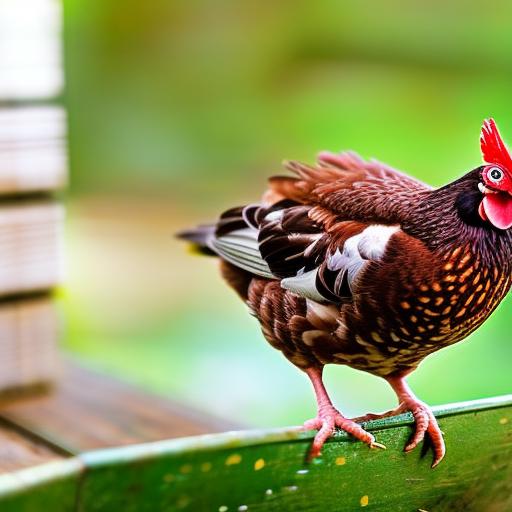Chicken keeping has a long history, dating back thousands of years. Initially, chickens were kept for their meat and eggs, providing a sustainable source of food for families. Over time, chicken keeping evolved into a hobby and a way to connect with nature. However, in recent years, there has been a growing trend of keeping chickens indoors.
The rise of indoor chicken keeping can be attributed to several factors. One of the main reasons is the increasing urbanization and limited space in many areas. People who live in apartments or small houses may not have access to a backyard or suitable outdoor space for traditional chicken keeping. Indoor chicken keeping provides a solution for those who want to enjoy the benefits of raising chickens but have limited space.
There are several benefits to keeping chickens indoors. One of the main advantages is the reduced carbon footprint. By keeping chickens indoors, you eliminate the need for large outdoor spaces and reduce the amount of land required for traditional chicken farming. Additionally, indoor chicken keeping allows for better control over the chickens’ environment, resulting in healthier and more productive birds.
Another benefit of indoor chicken keeping is the ability to have fresh eggs year-round. Outdoor chickens may stop laying eggs during the winter months due to colder temperatures and shorter daylight hours. By keeping chickens indoors, you can provide them with artificial lighting and maintain consistent temperatures, ensuring a steady supply of fresh eggs throughout the year.
Indoor chicken keeping also reduces the risk of predators. Outdoor chickens are vulnerable to attacks from predators such as foxes, raccoons, and hawks. By keeping chickens indoors, you can protect them from these threats and provide them with a safe and secure environment.
Furthermore, indoor chicken keeping reduces the risk of disease. Outdoor chickens are exposed to various pathogens and parasites that can cause illness and even death. By keeping chickens indoors, you can minimize their exposure to these risks and implement strict biosecurity measures to prevent the spread of diseases.
Key Takeaways
- Indoor chicken keeping is a growing trend that offers sustainability and convenience.
- Choosing the right breed is important for indoor chickens, considering factors such as size and temperament.
- Setting up an indoor chicken coop requires careful consideration of space and design.
- Feeding and watering indoor chickens requires best practices and tips for optimal health.
- Maintaining indoor chicken health involves preventing common health issues and managing waste through composting and disposal options.
Benefits of Keeping Chickens Indoors: A Sustainable and Convenient Option
One of the main benefits of keeping chickens indoors is the reduced carbon footprint. Traditional chicken farming requires large amounts of land for outdoor runs and grazing areas. By keeping chickens indoors, you eliminate the need for these spaces, reducing the overall land usage. This is especially important in urban areas where space is limited and land is scarce. Indoor chicken keeping allows for a more sustainable and efficient use of resources.
Another benefit of indoor chicken keeping is the ability to have fresh eggs year-round. Outdoor chickens may stop laying eggs during the winter months due to colder temperatures and shorter daylight hours. By keeping chickens indoors, you can provide them with artificial lighting and maintain consistent temperatures, ensuring a steady supply of fresh eggs throughout the year. This can be particularly advantageous for those who rely on eggs as a staple in their diet or for those who enjoy baking and cooking with fresh eggs.
Indoor chicken keeping also reduces the risk of predators. Outdoor chickens are vulnerable to attacks from predators such as foxes, raccoons, and hawks. By keeping chickens indoors, you can protect them from these threats and provide them with a safe and secure environment. This can give peace of mind to chicken keepers who live in areas with high predator populations or who have had previous experiences with predator attacks.
Furthermore, indoor chicken keeping reduces the risk of disease. Outdoor chickens are exposed to various pathogens and parasites that can cause illness and even death. By keeping chickens indoors, you can minimize their exposure to these risks and implement strict biosecurity measures to prevent the spread of diseases. This can help ensure the health and well-being of your flock and reduce the need for veterinary interventions.
Choosing the Right Breed: Factors to Consider for Indoor Chickens
When it comes to choosing the right breed for indoor chicken keeping, there are several factors to consider. The size and temperament of the breed are important considerations, as well as their egg-laying capacity, noise level, and cold tolerance.
Size and temperament are important factors to consider when choosing a breed for indoor chicken keeping. Some breeds are larger and more active, requiring more space to move around. If you have limited space indoors, it may be best to choose a smaller breed that is more suited to confinement. Additionally, some breeds have more docile temperaments and are better suited to indoor living, while others may be more flighty or aggressive.
Egg-laying capacity is another important factor to consider. If you are keeping chickens primarily for their eggs, you will want to choose a breed that is known for its high egg production. Some breeds are better layers than others and can provide you with a steady supply of fresh eggs year-round.
Noise level is another consideration when choosing a breed for indoor chicken keeping. Some breeds are known for being quieter and less prone to excessive vocalization, while others may be more vocal and noisy. If you live in an apartment or have close neighbors, it may be best to choose a breed that is quieter to minimize disturbances.
Cold tolerance is also an important factor to consider, especially if you live in a colder climate. Some breeds are more cold-hardy and can tolerate lower temperatures better than others. If you plan on keeping your chickens indoors year-round without access to outdoor runs or grazing areas, it is important to choose a breed that can thrive in indoor environments and handle colder temperatures.
Setting Up Your Indoor Chicken Coop: Space and Design Considerations
| Consideration | Measurement | Recommendation |
|---|---|---|
| Space per chicken | 4 square feet | Provide at least 4 square feet of space per chicken to prevent overcrowding and promote healthy living conditions. |
| Roosting space | 8 inches per chicken | Provide at least 8 inches of roosting space per chicken to allow them to perch comfortably at night. |
| Nesting boxes | 1 box per 3-4 chickens | Provide at least 1 nesting box for every 3-4 chickens to encourage egg laying and prevent competition for nesting space. |
| Lighting | 14-16 hours per day | Provide 14-16 hours of light per day to encourage egg laying and promote healthy growth and development. |
| Ventilation | 1 square foot of vent space per 10 square feet of coop | Provide at least 1 square foot of ventilation space for every 10 square feet of coop to prevent moisture buildup and promote good air quality. |
| Cleaning | Weekly | Clean the coop and nesting boxes at least once a week to prevent the buildup of bacteria and parasites. |
When setting up your indoor chicken coop, there are several space and design considerations to keep in mind. Choosing the right location, determining the coop size and design, ensuring proper lighting and ventilation, and selecting the right flooring and bedding are all important factors to consider.
Choosing the right location for your indoor chicken coop is crucial. You will want to find a space that is well-ventilated, easily accessible for cleaning and maintenance, and away from areas with high foot traffic or noise. It is also important to consider the proximity to windows or doors, as chickens can be sensitive to drafts and temperature fluctuations.
The size and design of your indoor chicken coop will depend on the number of chickens you plan to keep and the available space in your home. It is important to provide enough space for each chicken to move around comfortably and engage in natural behaviors such as perching, dust bathing, and nesting. The coop should also have adequate roosting bars, nesting boxes, and feeding and watering stations.
Proper lighting and ventilation are essential for the health and well-being of your indoor chickens. Chickens require natural light to regulate their internal clocks and maintain healthy egg production. If your coop does not have access to natural light, you will need to provide artificial lighting that mimics the natural daylight cycle. Additionally, proper ventilation is important to remove excess moisture, odors, and ammonia fumes from the coop.
The flooring and bedding in your indoor chicken coop should be easy to clean and provide a comfortable and sanitary environment for your chickens. Many chicken keepers opt for materials such as straw, wood shavings, or sand as bedding options. It is important to regularly clean and replace the bedding to prevent the buildup of waste and reduce the risk of disease.
Feeding and Watering Indoor Chickens: Best Practices and Tips
Feeding and watering your indoor chickens properly is essential for their health and well-being. Choosing the right feed, providing clean water, supplementing with treats, and avoiding overfeeding are all important aspects of feeding and watering indoor chickens.
Choosing the right feed for your indoor chickens is crucial. There are different types of chicken feed available on the market, including pellets, crumbles, and mash. It is important to choose a feed that is appropriate for the age and breed of your chickens. Additionally, you may want to consider organic or non-GMO feeds if you prefer to provide your chickens with a more natural diet.
Providing clean and fresh water is essential for the health of your indoor chickens. Chickens require access to clean water at all times to stay hydrated and maintain proper bodily functions. It is important to regularly clean and refill the water containers to prevent the buildup of bacteria and algae. Additionally, during the winter months, you may need to provide heated waterers to prevent freezing.
Supplementing your indoor chickens’ diet with treats can be a fun and rewarding experience. Treats such as fruits, vegetables, and mealworms can provide additional nutrients and enrichment for your chickens. However, it is important to offer treats in moderation and avoid overfeeding. Too many treats can lead to nutritional imbalances and obesity in chickens.
Avoiding overfeeding is crucial for the health of your indoor chickens. Chickens have a natural instinct to eat whenever food is available, which can lead to overeating if not monitored. Overfeeding can result in obesity, digestive issues, and other health problems. It is important to provide the appropriate amount of feed for your chickens’ age, breed, and activity level.
Maintaining Indoor Chicken Health: Common Health Issues and Prevention Strategies

Maintaining the health of your indoor chickens is essential for their overall well-being. Being aware of common health issues, recognizing signs of illness, implementing preventative measures, and knowing when to call a vet are all important aspects of maintaining indoor chicken health.
There are several common health issues that can affect indoor chickens. Respiratory infections, mites and lice infestations, egg-laying problems, and digestive issues are some of the most common health issues that chicken keepers may encounter. It is important to be familiar with these issues and know how to prevent and treat them.
Preventative measures are crucial for maintaining the health of your indoor chickens. Implementing strict biosecurity measures, such as quarantining new birds, regularly cleaning and disinfecting the coop, and practicing good hygiene, can help prevent the spread of diseases. Additionally, providing a balanced diet, regular exercise, and a stress-free environment can help boost your chickens’ immune system and reduce the risk of illness.
Recognizing signs of illness in your indoor chickens is important for early detection and treatment. Common signs of illness include lethargy, loss of appetite, changes in behavior or appearance, respiratory distress, abnormal droppings, and abnormal egg production. If you notice any of these signs, it is important to monitor your chickens closely and consult with a veterinarian if necessary.
Knowing when to call a vet is crucial for the health of your indoor chickens. While many minor health issues can be treated at home with proper care and medication, there are certain situations where professional veterinary intervention is necessary. If you are unsure about the severity of your chickens’ condition or if their symptoms worsen despite home treatment, it is best to seek veterinary advice.
Managing Indoor Chicken Waste: Composting and Disposal Options
Managing chicken waste is an important aspect of indoor chicken keeping. Composting chicken manure, disposing of waste safely, and using chicken waste as fertilizer are all options for managing indoor chicken waste.
Composting chicken manure is a sustainable and environmentally friendly way to manage waste. Chicken manure is rich in nutrients and can be used as a valuable fertilizer for gardens and plants. To compost chicken manure, it is important to create a compost pile or bin specifically for the manure. The compost pile should be turned regularly to promote decomposition and prevent odors.
Disposing of waste safely is important for maintaining a clean and sanitary environment for your indoor chickens. Chicken waste should be collected and disposed of properly to prevent the buildup of bacteria and odors. It is important to use gloves and other protective gear when handling chicken waste to minimize the risk of contamination. Additionally, it is important to follow local regulations and guidelines for waste disposal.
Using chicken waste as fertilizer is another option for managing indoor chicken waste. Chicken manure is a valuable source of nutrients for plants and can be used to enrich soil and promote healthy growth. However, it is important to use chicken manure as fertilizer responsibly and in moderation. Excessive use of chicken manure can lead to nutrient imbalances and environmental pollution.
Noise and Odor Considerations: Minimizing Disturbances for Neighbors
Minimizing noise levels and odors is important for maintaining good relationships with neighbors when keeping chickens indoors. Reducing noise levels, minimizing odors, and communicating with neighbors are all important aspects of minimizing disturbances.
Reducing noise levels is crucial for maintaining a peaceful environment for both your chickens and your neighbors. Some breeds of chickens are naturally quieter than others, so choosing a breed with a lower noise level can help minimize disturbances. Additionally, providing adequate enrichment and stimulation for your chickens can help reduce excessive vocalization and boredom-related noise.
Minimizing odors is important for preventing unpleasant smells from permeating your home and bothering your neighbors. Regular cleaning and maintenance of the coop, proper ventilation, and using absorbent bedding materials can help reduce odors. Additionally, composting chicken manure properly can help prevent the buildup of odors.
Communicating with neighbors is essential for maintaining good relationships when keeping chickens indoors. It is important to inform your neighbors about your plans to keep chickens and address any concerns or questions they may have. Being open and transparent about your intentions can help alleviate any potential conflicts or misunderstandings.
Legal Considerations: Understanding Local Regulations for Indoor Chickens
Before embarking on indoor chicken keeping, it is important to understand and comply with local laws and regulations. Checking local laws and regulations, obtaining necessary permits, and following zoning laws are all important aspects of understanding the legal considerations of indoor chicken keeping.
Checking local laws and regulations is the first step in understanding the legal considerations of indoor chicken keeping. Different areas may have different rules and restrictions regarding the keeping of chickens. It is important to research and familiarize yourself with the specific regulations in your area to ensure compliance.
Obtaining necessary permits is another important aspect of complying with local regulations. Some areas may require permits or licenses for keeping chickens, especially in urban or residential areas. It is important to check with your local government or zoning department to determine if any permits are required and how to obtain them.
Following zoning laws is crucial for indoor chicken keeping. Zoning laws dictate how properties can be used and what activities are allowed in certain areas. Some areas may have specific zoning regulations regarding the keeping of livestock or poultry. It is important to check with your local zoning department to determine if indoor chicken keeping is allowed in your area and if there are any specific requirements or restrictions.
The Rewards and Challenges of Bringing the Farm Indoors
In conclusion, indoor chicken keeping offers a sustainable and convenient option for those who want to enjoy the benefits of raising chickens but have limited outdoor space. The benefits of indoor chicken keeping include a reduced carbon footprint, fresh eggs year-round, reduced risk of predators, and reduced risk of disease. However, there are also challenges to consider, such as the initial cost of setting up an indoor chicken coop and the ongoing expenses of providing proper ventilation, lighting, and heating. Additionally, indoor chicken keeping requires a significant amount of time and effort to maintain a clean and healthy environment for the chickens. It is important to carefully consider these challenges and ensure that you have the necessary resources and commitment before embarking on indoor chicken keeping. Overall, while there are rewards to be gained from bringing the farm indoors, it is essential to weigh the benefits against the challenges to make an informed decision.
If you’re considering keeping chickens inside your house, you may also be interested in learning about how to care for goslings. Goslings require special attention and care to ensure their health and well-being. Poultry Wizard has a helpful article on how to care for goslings that provides valuable information on feeding, housing, and general care tips for these adorable baby geese. Whether you’re a beginner or an experienced poultry keeper, this article will guide you through the process of raising healthy goslings.
FAQs
What are the benefits of keeping chickens inside the house?
Keeping chickens inside the house can provide a source of fresh eggs, entertainment, and companionship. They can also help with pest control and provide fertilizer for plants.
What are the potential drawbacks of keeping chickens inside the house?
Chickens can be messy and noisy, and their droppings can create an unpleasant odor. They also require a lot of space and can damage furniture and other household items.
What kind of space do chickens need inside the house?
Chickens need a large, well-ventilated space with plenty of room to move around. They also need access to food and water, as well as a place to roost and lay eggs.
What kind of food do chickens need?
Chickens need a balanced diet that includes grains, protein, and vitamins and minerals. They can eat a variety of foods, including commercial chicken feed, fruits and vegetables, and insects.
How do you keep chickens healthy inside the house?
To keep chickens healthy, it’s important to provide them with a clean and comfortable living space, access to fresh food and water, and regular veterinary care. It’s also important to practice good hygiene and sanitation to prevent the spread of disease.
What are some tips for keeping chickens inside the house?
Some tips for keeping chickens inside the house include providing plenty of space, keeping the living area clean and well-ventilated, providing access to food and water, and providing plenty of enrichment activities to keep them entertained. It’s also important to be prepared for the mess and noise that comes with keeping chickens indoors.
Meet Walter, the feathered-friend fanatic of Florida! Nestled in the sunshine state, Walter struts through life with his feathered companions, clucking his way to happiness. With a coop that’s fancier than a five-star hotel, he’s the Don Juan of the chicken world. When he’s not teaching his hens to do the cha-cha, you’ll find him in a heated debate with his prized rooster, Sir Clucks-a-Lot. Walter’s poultry passion is no yolk; he’s the sunny-side-up guy you never knew you needed in your flock of friends!







